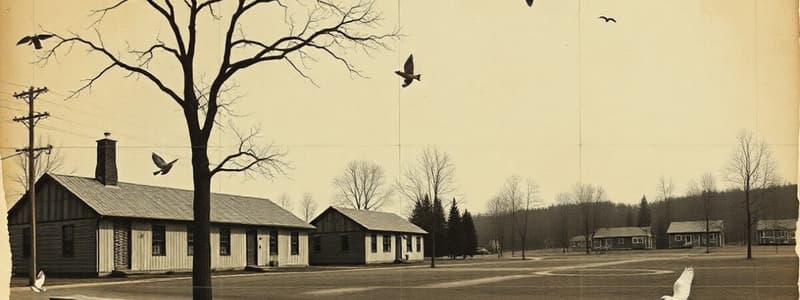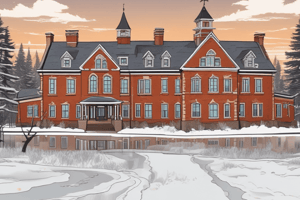Podcast
Questions and Answers
Which feature of democracy ensures that elected officials are held accountable?
Which feature of democracy ensures that elected officials are held accountable?
- Absolutism
- Periodic elections (correct)
- Single-party system
- Independent judiciary
What is the primary concern associated with party discipline among elected officials?
What is the primary concern associated with party discipline among elected officials?
- Enhanced media scrutiny
- Greater representation of minority opinions
- Increased voter turnout
- Loyalty conflicts with constituents (correct)
What concept describes the will of the majority regarding public opinion?
What concept describes the will of the majority regarding public opinion?
- Popular opinion (correct)
- Demographic representation
- Consensus decision making
- Lobbying
Which of the following is a characteristic of authoritarian government?
Which of the following is a characteristic of authoritarian government?
How does mandatory voting differ from voluntary voting in terms of voter turnout?
How does mandatory voting differ from voluntary voting in terms of voter turnout?
What is a key challenge in reaching a consensus in decision making?
What is a key challenge in reaching a consensus in decision making?
What effect can voter apathy have on liberal democracies?
What effect can voter apathy have on liberal democracies?
In a consensus government, how are differences typically resolved?
In a consensus government, how are differences typically resolved?
What was the primary goal of the Residential School System?
What was the primary goal of the Residential School System?
What was the outcome for First Nations men who accepted enfranchisement under the Gradual Civilization Act?
What was the outcome for First Nations men who accepted enfranchisement under the Gradual Civilization Act?
What was a significant impact of the Indian Act (1876) on Aboriginal people?
What was a significant impact of the Indian Act (1876) on Aboriginal people?
What was the main purpose of the Red Paper written in 1970?
What was the main purpose of the Red Paper written in 1970?
What represents a reason for nations to impose liberalism on others?
What represents a reason for nations to impose liberalism on others?
How did Woodrow Wilson influence the Treaty of Versailles?
How did Woodrow Wilson influence the Treaty of Versailles?
What was a primary reason for the USA, Canada, and Britain to invade Afghanistan in 2001?
What was a primary reason for the USA, Canada, and Britain to invade Afghanistan in 2001?
Which statement correctly describes the Indian Act regarding Aboriginal rights?
Which statement correctly describes the Indian Act regarding Aboriginal rights?
What was one of the key reasons for the USA's invasion of Iraq in 2003?
What was one of the key reasons for the USA's invasion of Iraq in 2003?
Which political system is characterized by direct participation of citizens in governance?
Which political system is characterized by direct participation of citizens in governance?
What term refers to the accountability of the executive and legislative branches to each other in Canada?
What term refers to the accountability of the executive and legislative branches to each other in Canada?
Which system of democracy allows for the election of representatives from defined electoral districts?
Which system of democracy allows for the election of representatives from defined electoral districts?
What does the term 'Representation by Population' mean in the context of electoral systems?
What does the term 'Representation by Population' mean in the context of electoral systems?
What is a major criticism of the first-past-the-post electoral system?
What is a major criticism of the first-past-the-post electoral system?
What role does the Governor General play in Canada’s parliamentary democracy?
What role does the Governor General play in Canada’s parliamentary democracy?
Which of the following best defines liberal democracy?
Which of the following best defines liberal democracy?
What was the international response to the invasion of Iraq in contrast to the invasion of Afghanistan?
What was the international response to the invasion of Iraq in contrast to the invasion of Afghanistan?
What system is primarily used in Sweden and Germany for selecting parties based on popular votes?
What system is primarily used in Sweden and Germany for selecting parties based on popular votes?
What was the main purpose of the economic embargo against Cuba?
What was the main purpose of the economic embargo against Cuba?
Which of the following best describes proportional representation?
Which of the following best describes proportional representation?
What characterizes a democratic political system?
What characterizes a democratic political system?
Which of the following best describes a representative democracy?
Which of the following best describes a representative democracy?
Flashcards
Residential School System
Residential School System
A policy of forcing Aboriginal children into boarding schools with the goal of assimilating them into Western culture.
Enfranchisement
Enfranchisement
The process of granting full citizenship rights to individuals, usually by relinquishing their original status or identity.
The Indian Act (1876)
The Indian Act (1876)
A Canadian law enacted in 1876, initially intended to assimilate Aboriginal people into European culture by stripping them of their rights and traditional practices.
The Red Paper (1970)
The Red Paper (1970)
Signup and view all the flashcards
Imposing Liberalism
Imposing Liberalism
Signup and view all the flashcards
The 'War on Terror'
The 'War on Terror'
Signup and view all the flashcards
Treaty of Versailles
Treaty of Versailles
Signup and view all the flashcards
Afghanistan
Afghanistan
Signup and view all the flashcards
Representative Democracy
Representative Democracy
Signup and view all the flashcards
Checks and Balances
Checks and Balances
Signup and view all the flashcards
Voter Apathy
Voter Apathy
Signup and view all the flashcards
Party Discipline
Party Discipline
Signup and view all the flashcards
Rule of Law
Rule of Law
Signup and view all the flashcards
Independent Judiciary
Independent Judiciary
Signup and view all the flashcards
Lobby Groups
Lobby Groups
Signup and view all the flashcards
Consensus Decision Making
Consensus Decision Making
Signup and view all the flashcards
Liberal Democracy
Liberal Democracy
Signup and view all the flashcards
Direct Democracy
Direct Democracy
Signup and view all the flashcards
Parliamentary Democracy
Parliamentary Democracy
Signup and view all the flashcards
Republic
Republic
Signup and view all the flashcards
First-Past-The-Post
First-Past-The-Post
Signup and view all the flashcards
Proportional Representation
Proportional Representation
Signup and view all the flashcards
Minority Government
Minority Government
Signup and view all the flashcards
Containment
Containment
Signup and view all the flashcards
Impositions of Liberalism for Humanitarian Reasons
Impositions of Liberalism for Humanitarian Reasons
Signup and view all the flashcards
Economic Embargo
Economic Embargo
Signup and view all the flashcards
Dictator
Dictator
Signup and view all the flashcards
Big Five (Security Council)
Big Five (Security Council)
Signup and view all the flashcards
Representation by Population
Representation by Population
Signup and view all the flashcards
Single-Member Constituency
Single-Member Constituency
Signup and view all the flashcards
Study Notes
Residential School System
- Designed to assimilate Aboriginal children into Western culture.
- Imposed by the Canadian government.
Enfranchisement
- The Gradual Civilization Act aimed to absorb First Nations people.
- Allowed First Nations men to give up their status for land ownership.
The Indian Act (1876)
- Intended to assimilate Aboriginal people into white Canadian culture.
- Forced changes in lifestyle and traditions.
- Ironically, led to greater awareness of Aboriginal rights and eventually the right to vote (1960) without losing cultural identity.
The Red Paper (1970)
- Also known as "Citizens Plus".
- Aboriginal response to the Canadian government's assimilation policies, starting with the White Paper of 1969.
- Created by the National Indian Brotherhood (now the AFN).
- Called for a return to traditional land ownership and treaty rights.
Imposing Liberalism
- Nations impose ideologies like liberalism for self-interest (e.g., eliminating threats) and humanitarian reasons (e.g., improving living standards).
Treaty of Versailles
- Woodrow Wilson (US President) emphasized democracy as a peace treaty component.
- The Weimar Republic (German) adopted democracy and elections.
Afghanistan
- The "War on Terror" (US-led military, political, and ideological conflict) followed terrorist attacks.
- Afghanistan and Iraq were targets due to perceived threats to liberal democracies.
- US, Canada, and Britain invaded Afghanistan in 2001 to remove the Taliban, who supported al-Qaeda.
Iraq
- Invaded in 2003, argued to be a threat to US and global security due to potential WMD use to aid terrorist groups.
- Saddam Hussein was indicted and convicted for crimes against humanity, including mass murder.
- The war lacked the international support of the Afghanistan conflict.
- The UN deemed the Iraq invasion illegal, with France vetoing it.
Impositions of Liberalism for Humanitarian Reasons
- Example: US economic embargo against Cuba (1960) to end communism and promote liberalism.
- Afghanistan and Iraq invasions partly based on human rights concerns regarding Taliban and Hussein regimes.
Political Systems
- Two main types: democracies and dictatorships.
- Democracy (Rule by the people) – power vested in the people.
- Liberal democracy – limits government power, guarantees individual rights.
- Direct democracy – every voter participates (small populations).
- Representative democracy – citizens elect representatives to govern.
Canada's Parliamentary Democracy
- Executive (PM) and legislative branches are accountable.
- Vote of non-confidence can lead to the government's downfall.
- Governor General, an appointed representative of the Queen, dissolves Parliament in a vote of no confidence.
Liberal Democracy
- Guarantees individual rights and freedoms.
- Belief in individual equality.
- Allows citizens to vote for leaders.
- Multiple political parties.
- Decisions made through legislature, legal rulings based on independent judiciary.
Republican Democracy
- Nation is independent from a monarch.
- Representatives from constituencies using first-past-the-post system. "Representation by Population" concept.
- Similar to presidential democracy with presidential veto power.
Proportional Representation
- Parties gain seats based on the percentage of votes received.
- Closely reflects population share.
- Disadvantages – Minority governments (unstable).
Accountability of Elected Representatives
- Democratic systems feature checks and balances to prevent majority tyranny.
Party Discipline
- MPs loyalty to party and leader.
- MPs can dissent or complain in caucus meetings.
Voter Apathy
- Declining voter participation.
- 68.5% voter turnout in the 2015 Canadian election.
- Important for democracy to maintain citizen engagement.
Popular Opinion
- Majority citizens' will on an issue.
- Governments may or may not follow popular opinion.
Consensus Decision Making
- Resolves issues through shared concerns and solutions that all parties accept.
- Practiced in Nunavut and Northwest Territories.
Authoritarianism
- Government authority in an elite group.
- Often characterized by a single party dictatorship.
- Rejects liberal principles, believing the party represents the people.
- Historical examples include Adolf Hitler and Stalin.
Studying That Suits You
Use AI to generate personalized quizzes and flashcards to suit your learning preferences.




